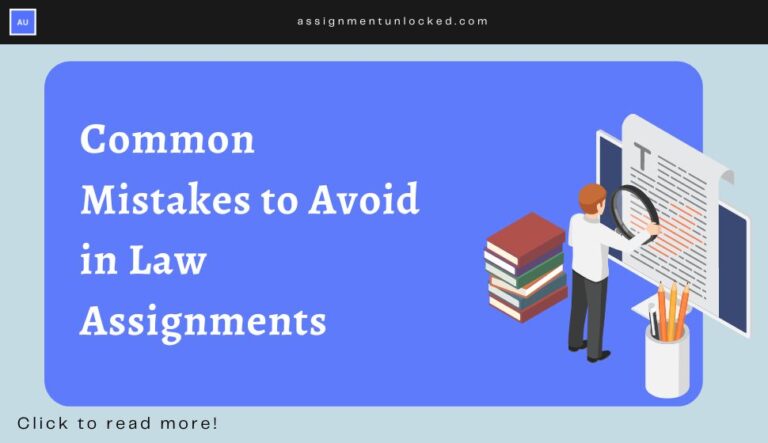Law assignments are an essential part of law students’ academic curriculum. They are designed to help students enhance their analytical skills, develop critical thinking abilities, and improve their understanding of the Law. However, law assignments can be challenging and require much hard work, research, and attention to detail.
In this article, we will discuss common mistakes to avoid in law assignments; with Law, Assignment helps students improve their grades and get better results.
Introduction
High levels of analytical and critical thinking abilities are needed for law assignment help. In-depth study, case analysis, and the application of legal ideas are all required of students. However students frequently make errors that lead to bad grades and frustration. In this post, we’ll look at some typical errors students make when writing their law essays and discuss how to prevent them.
- Lack of Understanding of the Law
One of the most frequent errors students make when completing law assignments is a lack of legal knowledge. Before writing their projects, students must have a firm grasp of the legal concepts and principles. Students need to dedicate adequate time to studying the Law and obtaining information from various books, websites, and legal magazines.
- Failure to Analyze the Question
Another common mistake students make in law assignments is a failure to analyze the question. Law assignments usually require students to analyze a legal problem or issue and provide a solution or recommendation. Students should carefully read and understand the question before writing their assignments. They should also identify the legal issues and apply the relevant legal principles to the facts of the case.
- Lack of Organization
Lack of organization is another common mistake that students make in law assignments. Students should organize their assignments logically and coherently, with a clear introduction, body, and conclusion. They should also use headings and subheadings to make their assignments more readable and easy to follow.
- Failure to Cite Sources
Failure to cite sources is another common mistake that students make in law assignments. Students should cite all their sources in their assignments, including textbooks, online resources, and legal journals. They should also follow the citation style recommended by their university or professor.
- Insufficient Research and Lack of Understanding
Another common mistakes in law students make is not conducting enough research or failing to understand the topic fully. Gathering sufficient information from credible sources, such as academic journals and textbooks. You may write irrelevant content or miss critical information without a proper understanding of the subject matter.
- Plagiarism
A serious academic offence, plagiarism has serious repercussions, including expulsion from the university. The content must be original, and all references must be properly mentioned. You can examine your work using a variety of available plagiarism detection software.
- Not Following the Required Format and Structure
Law assignments often have specific formats and structures that students must follow. Please adhere to these guidelines to ensure a higher grade. Reading the assignment brief carefully and understanding the required format and structure is essential.
- Poor Grammar, Spelling, and Punctuation
Good grammar, spelling, and punctuation are critical to writing a successful law assignment. Poor grammar can make your writing unclear and difficult to understand. It is important to proofread your work carefully and use tools such as grammar checkers to catch any mistakes.
- Lack of Coherence and Organization
A well-organized and coherent law assignment is essential to ensure your ideas are clear and easy to follow. Without proper organization, your writing may lack coherence, and your arguments may not be convincing. Make sure that your ideas are logically structured and presented clearly and concisely.
- Not Citing Sources Properly
Citing sources correctly is crucial to avoid plagiarism and to demonstrate that you have conducted thorough research. It is essential to use the correct citation style, such as APA, Harvard, or MLA, and to ensure that all sources are cited correctly.
- Overreliance on Secondary Sources
While secondary sources can be useful, it is important not to rely too heavily on them. Law assignments often require students to analyze and evaluate primary sources such as case law, statutes, and regulations. Use primary sources to support your arguments and use secondary sources sparingly.
- Failing to Analyze and Evaluate the Law Critically
A common mistake law students make is failing to analyze and evaluate the Law critically. Law assignments require students to apply legal principles to real-world scenarios and evaluate legal arguments’ strengths and weaknesses. Make sure that you analyze the Law critically and consider different perspectives.
- Not Proofreading and Editing the Assignment
Proofreading and editing are essential to ensuring that your law assignment is high quality. Reviewing your work carefully and making any necessary changes to improve clarity, coherence, and organization is important. You can also ask a friend or colleague to review your work and provide feedback.
To avoid these mistakes, students should take their time to understand the instructions, conduct thorough research using reputable sources, carefully analyze and evaluate the information they gather, organize their ideas logically, and proofread their work before submission.
Quick Fixes for Common Writing Mistakes
Legal writing is challenging; let’s face it. However, many quick tweaks might assist you in developing a transparent, intelligible design. Here are my top 20 suggestions for making your legal writing better.
- Defined terms should be consistent.A serious academic offence, plagiarism has serious repercussions, including expulsion from the university. The content must be original, and all references must be properly mentioned. You can examine your work using a variety of available plagiarism detection software.
- If you label something A, there must be a B. If there is an A, there must also be a B. Use headings to organise your summary and help the reader understand your point of view. A title and a subheading are required for every section of legal writing. Also, they must to provide comparable grammar, structure, and content.
- Avoid conclusory language. For your reader to be persuaded, you will need more than just a conclusion.To construct a convincing case, you must cite the precise facts and legal authority supporting your conclusion. It is insufficient to state that “Defendant was manifestly negligent.” Instead, you must give the reader the information and justifications required for him to conclude that Defendant was, in fact, negligent.
- Avoid superfluous language and use plain English. Although learning legal terminology is a requirement of every legal education, becoming a good legal writer entails doing away with Latin, legalese, and other dated jargon. Those legal terms frequently only give the impression that a lawyer created the content. Typically, numerous more powerful, approachable alternatives convey the same ideas. Using legal jargon appropriately, but only when necessary, is a good general rule.
- Avoid being catty, snide or sarcastic. You come off as naive, immature, and unprofessional as a result. That doesn’t strengthen your legal case in any way. Also, judges abhor it!
- Ensure dates, names, and amounts are consistent. Just paying close attention to detail is necessary. I advise reviewing your document to ensure that all the names are consistent; for example, ensure you haven’t changed how you refer to “James Smith” midway through the brief to “Jim Smith.” Next, ensure your dates are correct and, if necessary, in chronological order. Check all monetary sums again, particularly any parenthetical numerical quantities and their matching textual amounts.
With these quick fixes in mind, anyone can become a better writer and avoid common mistakes that can detract from their message, or you can take help from Assignment Unlocked, the best Law assignment help.
Conclusion
Understanding the assignment requirements, conducting sufficient research, organizing ideas properly, analyzing cases, writing clearly, citing sources correctly, and proofreading the paper carefully is important. Students who avoid the common mistakes discussed in this article can produce high-quality papers demonstrating their knowledge and understanding of the subject.






